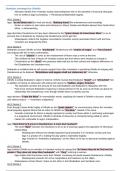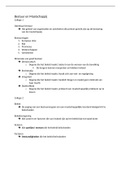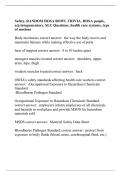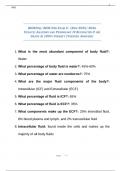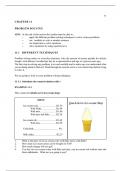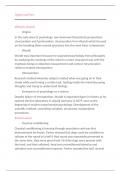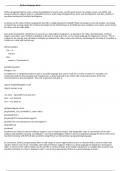- Alienates Othello from Venetian society and predisposes him to his hamartia of insecurity that grips
him so swiftly at Iago’s prompting. -> Renaissance/Materialist tragedy
Act 1 Scene 1
Iago: “an old black ram”(for food and wool), “Barbary horse”(for entertainment and breeding)
- Diction in relation to skin colour and reference to Moors’ Berber and Muslim descent from North-West
Africa -> dehumanising
Iago describes Desdemona to have been delivered to the “gross clasps of a lascivious Moor” so as to
provoke fear in Brabantio by implying that Desdemona cannot get free.
- Shakespeare reflects the negative connotations Venetian society associates Moors with and how
Venetians are disgusted by them.
Act 1 Scene 2
Brabantio accuses Othello to have “enchanted” Desdemona with “chains of magic” and “foul charms”
into eloping with him in their confrontation.
- The use of “chains” is ironic as the enslavement of Moors was a norm at the time.
- This exhibits the fear of Moors of Venetian society and how Moors were viewed as a threat to
Christendom as the “devil” who practises witchcraft due to their cultural and religious differences in
the Elizabethan and Jacobean eras..
Brabantio is confident that he will receive support from other Venetians in punishing Othello for eloping with
Desdemona as he believes “Bondslaves and pagans shall our statesmen be” otherwise.
Act 1 Scene 3
Othello is simply Brabantio’s object of interest. Othello reveals that Brabantio “loved” and “oft invited” him
in addition to having an obsession with asking him about his “battles, sieges, fortunes”.
- The asyndetic stresses the amount he has told Brabatnio and Brabantio’s infatuation with him.
- Past tense stresses Brabantio’s hypocrisy in losing interest in him as soon as he finds out about his
relationship with Desdemona, even though Othello does not openly say this.
Iago declares “I hate the Moor” in monosyllabic words, signifying his hatred of Othello to be pure, simple
and without reason. -> “motiveless malignancy”
Act 2 Scene 1
Even though Cassio thinks highly of Othello as his “great captain”, he unconsciously shares the Venetian
racial prejudice against Moors that he refers to Othello as “the Moor” instead of his name.
- Venetian contempt for Moors is deeply ingrained in society and those within it, and being submerged
in a prejudiced environment, Othello’s hamartia of insecurity is constantly being called to, which
makes him vulnerable to Iago’s manipulation.
Iago “dare think he’ll prove to Desdemona / A most dear husband”.
- The word “dare” stresses his reluctance to do so as it would go against his opposition of interracial
relationships.
- Shakespeare reflects how deeply ingrained racial prejudice is in Venetian society and how
Iago is a product of it, making the play partly a materialist tragedy.
- Iago reveals his “motiveless malignancy” as the villain as he has no personal vendetta against
Othello.
Act 3 Scene 3
Iago isolates Othello as an outsider to Venetian society by saying that “In Venice they do let God see the
pranks / They dare not show their husbands” with “they” referring to women.
- Iago implies that God knows more than Othello, increasing his doubt towards Desdemona’s fidelity.
- Shakespeare presents him to be manipulative and malicious as the villain.
- Shakespeare echoes Moors’ status as the other in the Elizabethan and Jacobean eras.
Act 4 Scene 1
,Iago describes Othello’s jealousy as “unbookish”, reflecting the common racial stereotype of Moors being
“erring barbarians” whose appearance and decision-making skills were diminished to their race in addition to
his sense of superiority.
- Shakespeare demonstrates Venetian contempt for Moors to contribute to Othello’s contrived ruination
that modern critics could construe the play as a Renaissance/Materialist tragedy.
Act 5 Scene 2
Emilia contrasts Desdemona with Othello in saying “O the more angel she, / And you the blacker devil”.
- Through the diction in relation to race associated with negative connotations, Emilia reflects the
prevalent Venetian contempt for Moors in the Elizabethan and Jacobean eras.
- Through Emilia’s emphasis on Desdemona’s angelic purity, Shakespeare reinforces Desdemona’s
role as a sympathetic character whose downfall evokes pity from the audience.
- By likening Othello to the “devil”, Shakespeare reflects upon the common Elizabethan racial
stereotype of Moors as a threat to Christendom.
Humility and goodness / Nobility / Morality
- Conforms to Aristotelian tragedy: The tragic hero, Othello is consistently good, but loses his moral
goodness..
Act 1 Scene 2
Othello’s brief response “Tis better as it is” demonstrates his nobility and refusal to be drawn into petty
discourse.
- His eloquence is evident, which makes his future linguistic breakdown more tragic and sympathetic.
Othello advocates peace in his confrontation with Brabantio in which he asks Brabantio’s men to “Keep up
your bright swords, for the dew will rust them” with a poetic description of nature and refers to Brabantio
as “Good signor”.
Act 1 Scene 3
Othello greets the Duke and senators as “Most potent, grave, and reverend signors” and his “very noble
and approved good masters”, which highlights how respectful he is to his superiors and how he is able to
maintain his eloquence even when he is being accused of witchcraft.
Othello uses the excuse “Rude I am in my speech” to humble himself before the Duke and the senators,
which can be seen as an attempt to win their trust and favour.
- Despite having impressive military talent and experience, he remains humble.
Othello puts himself “by your gracious patience” before the Duke.
- He puts himself at the Duke’s mercy and believes justice will be served.
- He is avoiding setting up himself as a threat so as to win the Duke’s favour.
Othello admits to having “married” Desdemona through a simple declaration of intent.
- The lack of excuses and attempt for deception on his part reveals him to be honest and true to type.
Iago does not give “A fig” for “Virtue”.
- Shakespeare provides an insight into Iago’s subverted morality as a Machievellian character through
giving him devilish qualities that he demeans and ridicules virtue as unimportant.
- Shakespeare incorporates the common features of the fifteenth and sixteenth century
European mediaval and Renaissance morality plays while having Iago conform to the tragic
convention of villains having an absent moral compass.
Iago sees Roderigo cuckolding Othello to be doing Roderigo “a pleasure” and him “a sport” and his
revenge on Othello to be for his “sport and profit”.
- Diction in relation to entertainment and gain reveals that he takes pleasure in others’ pain, which
highlights his “motiveless malignancy” and subverted morality as the villain of the tragedy.
,Iago plans to carry out his revenge in the “womb of time” that he twists the image of birth and fertility to
encompass his plan to destroy Othello, which is suggestive of his subverted morals.
- Iago later describes his plan to ruin Othello to be a “monstrous birth”.
- This distorted image of childbirth hints that Iago’s revenge shall ruin Othello’s life.
Iago seeks to “plume up my will / In double knavery” by manipulating both Cassio and Othello
- The word “double” implies treachery.
- He is proud to be able to manipulate others and ruin two people at the same time.
- A psychoanalyst would see his plan to destroy Othello as a call to hi’s superego, which
emphasises his subverted morality and love for evil.
Act 2 Scene 1
Iago encourages Roderigo to “put money in thy purse” so as to keep his will to himself and be prepared
when Desdemona is “sated with his body”, referring to Othello.
- Sees love and personal will in economic terms -> twisted morality + Marxist: proto-capitalist thinking.
Othello calls Desdemona “my fair warrior” while Desdemona replies by calling him “my dear Othello”.
- Their use of the personal pronoun “my” and stichomythia signifies the equality between them.
- His use of military language and the same title he has in his epithet for Desdemona reveals him to be
respectful of women, playful and reverend, conforming to the tragic hero being consistently good.
- Shakespeare paves the way for their tragic ending as their love displayed here is to be defeated and
end with their deaths.
Desdemona describes Iago to “praisest the worst best”.
- Shakespeare employs dramatic irony in how Desdemona’s remark echoes to how Iago actually
praises the worst qualities best due to his subverted morality which causes him to see conventionally
admirable qualities as weaknesses and undesirable ones as strengths.
- Iago fuels his own hatred towards Othello by listing Othello’s admirable qualities of having “a
constant, loving, noble nature” as flaws.
- He reveals his continual “motiveless malignancy” and inability to compliment someone
without criticism as the villain.
Iago sees Casio’s courtly behaviour towards Desdemona to be him being “most apt to play the sir in”,
which reveals his perversion of courtly love into cuckoldry and superficiality when it is simply the typical
politeness gentlemen displayed to women in the Elizabethan and Jacobean eras.
- Iago describes Cassio’s courtly love to be “tricks”, suggesting Cassio to be pretentious.
- Reflects his subverted morality as the villain of a tragedy.
Iago does not mention Othello’s love for Desdemona when saying “Cassio loves her” based on his courtly
love -> he twists reality to fit his narrative while highlighting his shallow and perverted understanding of love.
Iago has to convince himself of the weight of his own lie about Desdemona’s implied affair with Cassio by
telling himself “That she loves him, ‘tis apt and of great credit” in his soliloquy.
- Shakespeare emphasises his determination to obstruct Othello’s fortune as the villain.
Iago claims that he “do love” Desdemona, but “Not out of absolute love”.
- He sees love only as lust and talks about love casually, hinting his inability to understand love.
Iago claims that “nothing can or shall content my soul” until his “evened with him, wife for wife”.
- The religious word “soul” hyperbolically reveals that his soul is gladdened by others’ destruction.
- Shakespeare demonstrates his corrupted notion of justice and hence subverted morality as
the villain.
, Act 2 Scene 3
Othello seeks to stop savage behaviour among his men and Montano through the rhetorical question “Are
we turned Turks” with “Turks” meaning uncivilised barbarians while demanding them to “For Christian
shame, put by this barbarous brawl”.
- Shakespeare presents Othello as an advocate of peace, repentance and absolution, demonstrating
his moral goodness as the tragic hero.
- The plosive ‘b’ sound creates a violent sounding.
- His choice of words is ironic as the word ‘barbarian’ is often misused against him and Moors were
often seen as a threat to Christendom in the Elizabethan and Jacobean eras.
- Through the religious reference, Shakespeare reflects how Othello has been transformed by
Venetian society from a “barbary” to a paragon of Christian virtue.
Shakespeare portrays Othello to be just and rational in wanting to know all details before coming to a
decision through his question “Give me to know / How this foul rout began, who set it on”.
- Othello conforms to the Aristotelian tragic convention of being consistently good as the tragic hero.
- Shakespeare thus makes his future loss of his rationality more tragic.
Iago claims himself to be “an honest man” to Cassio.
- Shakespeare employs dramatic irony to demonstrate Iago’s manipulation of other characters and
generate helplessness and sympathy in the audience for Cassio as they watch Iago deceive him.
- As Iago uses his “honesty” to make claims, Shakespeare portrays Iago to disregard honesty,
reflecting his absent moral compass as the villain.
Iago believes that “there is more sense in” receiving “some bodily wound” “than in reputation”.
- He demonstrates his preference for primal pain, reflecting his subverted morality as the villain.
Iago criticises Cassio for being “too severe a moraller”.
- Shakespeare presents him to be pragmatic and disregard morality as unworthy of praise.
- He is thus a foil to Cassio’s moral goodness as the villain.
Iago advises Cassio, who is frustrated with his drunken behaviour, to “mend it for your good”.
- His metaphor of reparation echoes to his advice to Roderigo to “Put money in thy purse”.
- A psychoanalyst would view Iago as an advocate of control, reflecting his manipulative nature
as the villain.
Iago tells Cassio to “exclaim no more against” “good wine”.
- His choice of the word “good” reveals him to disagree with Cassio’s criticism of wine.
- He displays his lack of compassion and desire to take up responsibility for his part in leading
Cassio to his demotion. ->subverted morality as the villain.
Iago describes Othello’s “soul” to be “so enfettered to her love” with connotations of entrapment and
“That she may make, unmake, do what she list, / Even as her appetite shall play god / With his weak
function”.
- A post-colonialist would view this as an echo to the enslavement of Moors in the Elizabethan era.
- Iago uses an asyndetic list to show the extent to which Othello can be controlled by Desdemona.
- Shakespeare uses an enjambed line to reflect Desdemona’s ongoing control over Othello.
- The words “make”, “unmake” and “god” signify Desdemona’s power to systematically, piece by
piece, destroy Othello.
- Iago refers to Desdemona’s “appetite” as if she is some form of predator or is driven by base
instincts. -> has convinced himself that Desdemona’s implied affair is true.
- Shakespeare presents Iago to portray and thus view love negatively, reflecting his subverted morality
as the villain.
- Iago degrades Othello as “weak”, suggesting his sense of superiority over and racial hatred for him.
Iago playfulling tries to plead his innocence and justify his actions while acknowledging his evil in “When
devils will the blackest sins put on, / They do suggest at first with heavenly shows, / As I do now”.

